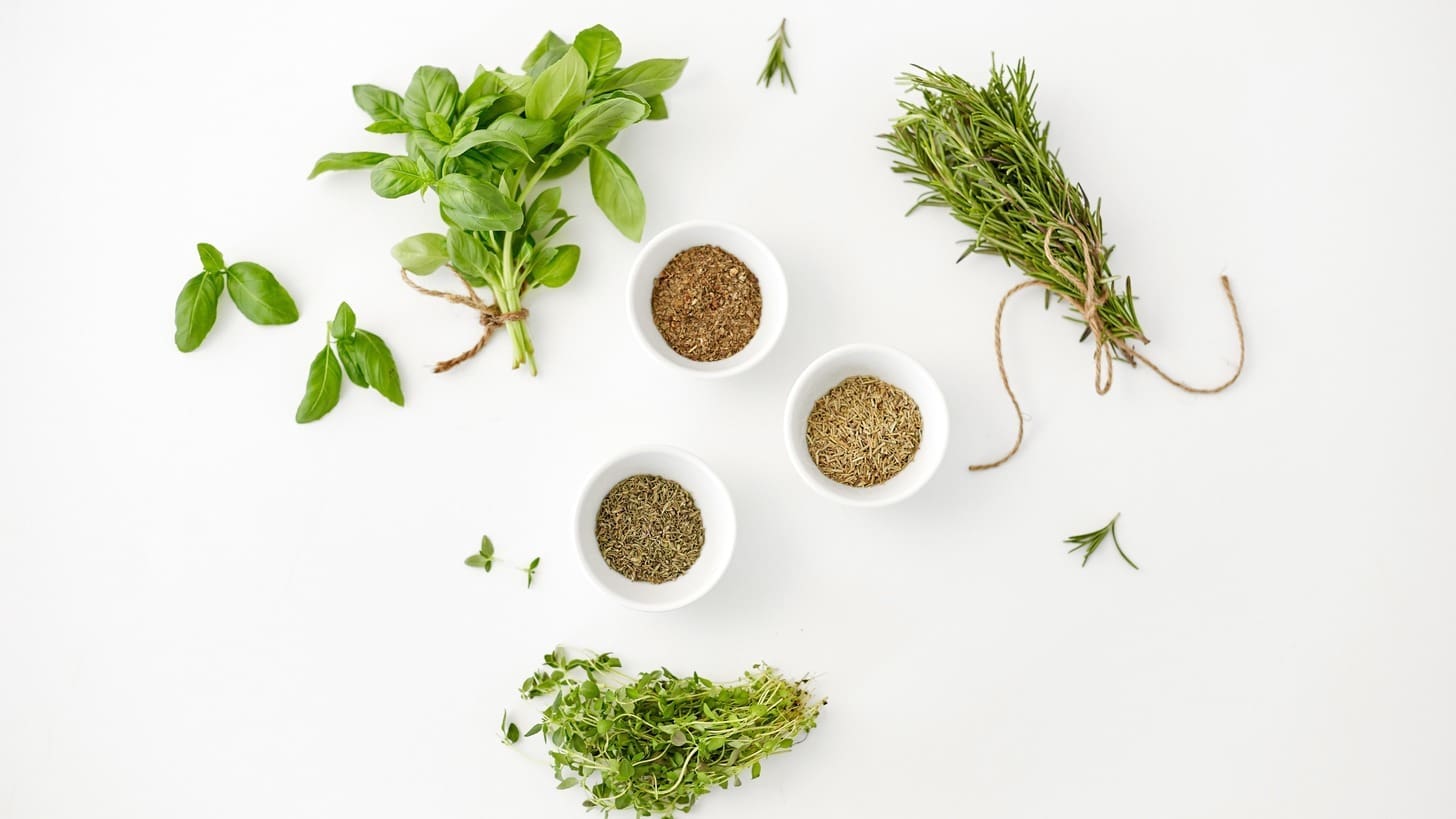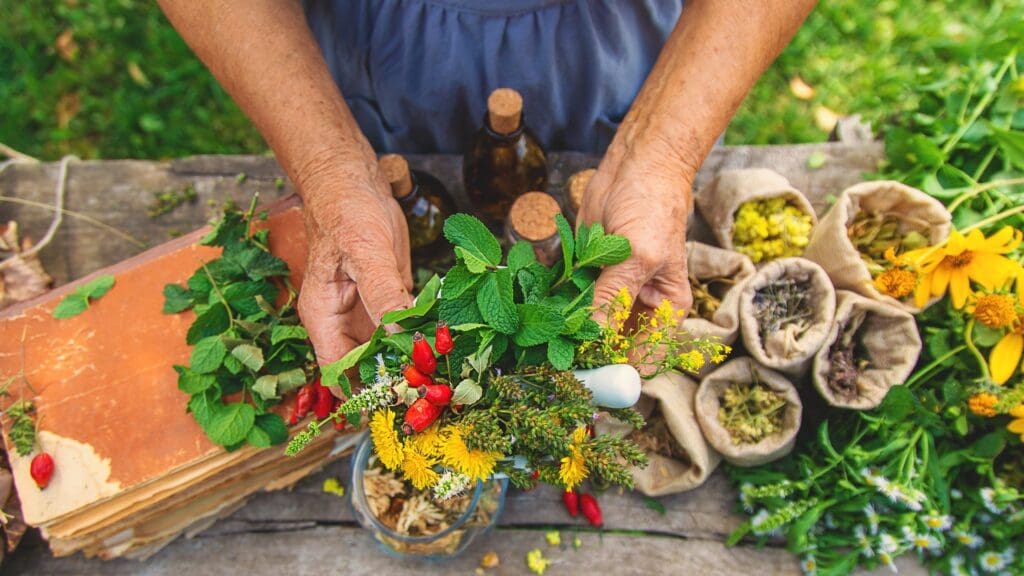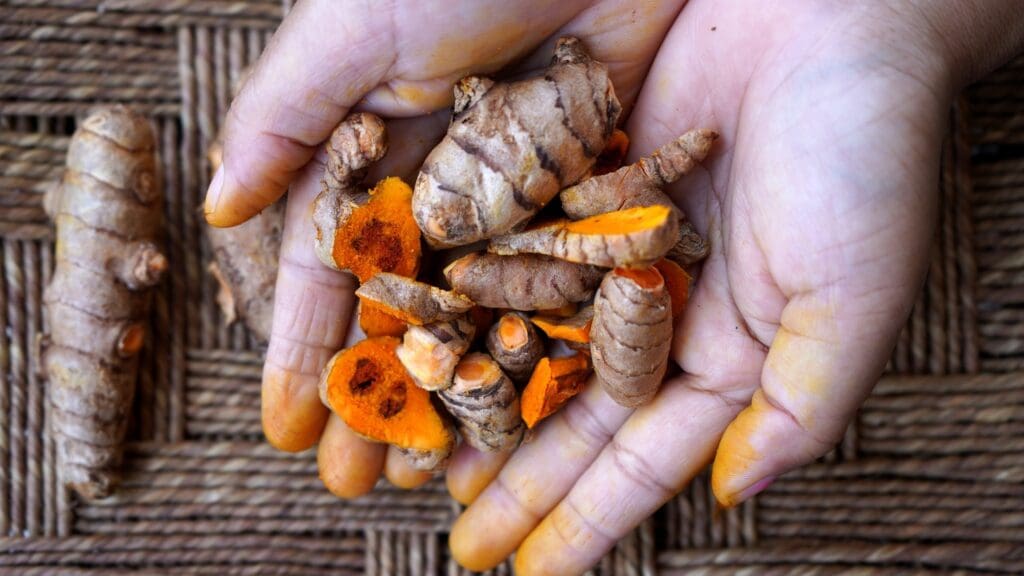Last Updated on November 27, 2025 by Bilal Hasdemir

Recent studies show a growing interest in natural remedies for cancer management. At Liv Hospital, we see the power of certain herbs to help with cancer treatments. These natural compounds can help kill cancer cells and stop tumors from growing, giving hope in the fight against cancer.
We aim to give top-notch healthcare and support to our patients. We look into how herbal medicine can boost well-being during cancer treatment. Our goal is to find anti-cancer herbs backed by science that can add benefits to traditional treatments.
Key Takeaways
- Natural remedies can complement conventional cancer treatments.
- Certain herbs have shown promise in stopping tumor growth.
- Herbal medicine may support overall health during cancer treatment.
- Liv Hospital is dedicated to exploring science-backed natural therapies.
- Combining natural remedies with traditional treatments may improve patient outcomes.
The Science Behind Natural Cancer-Fighting Compounds
Herbal remedies have been used for centuries to fight cancer. Now, modern research is uncovering how they work. We’re seeing a big change in cancer treatment, focusing more on natural compounds in herbs.
How Herbal Compounds Target Cancer Cells
Certain herbs target cancer cells in different ways. Some herbs have compounds that make cancer cells die, stopping tumors from growing. Others stop tumors from getting blood, which they need to grow.
Studies have found several ways herbal compounds fight cancer. These include:
- Helping the immune system find and fight cancer cells
- Stopping cancer cells from growing
- Making cancer cells die
- Stopping tumors from getting blood
| Herbal Compound | Mechanism of Action | Effect on Cancer Cells |
|---|---|---|
| Curcumin (Turmeric) | Induces apoptosis, inhibits angiogenesis | Reduces tumor growth and proliferation |
| Gingerol (Ginger) | Inhibits cell proliferation, induces apoptosis | Suppresses tumor growth and metastasis |
| Artemisinin (Artemisia) | Induces apoptosis, modulates immune response | Effective against various cancer cell lines |
Recent Research Validating Traditional Knowledge
Modern studies are proving that traditional herbs can help fight cancer. They show that some herbal extracts can make cancer treatments work better and have fewer side effects.
A study on Ganoderma lucidum (Reishi mushroom) found it boosts the immune system and helps cancer patients live longer. Research on Artemisia species also shows it can slow down cancer cell growth.
This research highlights the value of herbal remedies in cancer treatment. As we learn more, we might see cancer care that combines traditional and modern medicine.
Turmeric: The Golden Anti-Inflammatory Powerhouse
Turmeric is known for its anti-inflammatory properties, thanks to curcumin. It plays a big role in fighting cancer. This spice, often used in cooking, can help prevent and treat cancer.
Curcumin’s Role in Cancer Prevention and Treatment
Curcumin, found in turmeric, has been studied a lot for its anti-cancer effects. It stops cancer cells from growing and makes them die in cancers like breast, lung, and colon. We’ll look at how curcumin fights cancer.
Curcumin works by changing how cancer cells grow. It also has anti-inflammatory effects. These effects can lower the risk of cancer by reducing chronic inflammation, a cancer risk factor.
Effective Ways to Incorporate Turmeric into Your Daily Regimen
Adding turmeric to your daily life is easy and good for you. Here are some ways to do it:
- Add turmeric to your meals: Use turmeric as a spice in your cooking, such as in curries, soups, and stews.
- Turmeric tea: Make a tea by boiling turmeric in water or milk.
- Supplements: Consider taking curcumin supplements after consulting with a healthcare professional.
- Golden milk: Mix turmeric with milk or a milk alternative, such as almond milk, for a comforting drink.
When using turmeric or curcumin supplements, know the possible side effects and drug interactions. Always talk to a healthcare provider before starting any new supplement.
Ginger: Ancient Root with Potent Anti-Tumor Properties
Ginger is gaining attention as a natural cancer fighter. It has been used for centuries in traditional medicine. Recent studies show it might help prevent and treat cancer, thanks to its active compound, gingerol.
Gingerol’s Impact on Cancer Cells
Gingerol, found in ginger, can slow down cancer cell growth. Studies suggest it can stop the growth of many cancer types, like colon, ovarian, and pancreatic cancers. It does this by making cancer cells die and stopping new blood vessels from forming.
Gingerol’s ways to fight cancer include:
- Inducing apoptosis in cancer cells
- Inhibiting angiogenesis
- Modulating cellular signaling pathways
Optimal Ways to Consume Ginger for Therapeutic Benefits
To get the most from ginger, eat it in ways that boost its benefits. Raw ginger, ginger tea, and supplements are top choices. But how you prepare and eat ginger affects how much gingerol you get.
Here are some good ways to eat ginger:
- Add raw ginger to meals or juices
- Drink ginger tea from fresh or dried ginger
- Take ginger supplements with a doctor’s advice
Always talk to a doctor before starting new supplements, like ginger, if you’re fighting cancer. Adding ginger to your diet might help your body fight cancer better.
Artemisia Herba-Alba: Desert Herb with Promising Cytotoxic Effects
Artemisia herba-alba is a desert herb known for its toughness. It has shown promise in fighting colorectal cancer. This herb has been used for its health benefits for a long time. Recent studies have confirmed its ability to kill cancer cells.
Studies on Colorectal Cancer Cell Inhibition
Studies have found that Artemisia herba-alba extracts can kill colorectal cancer cells. It does this by causing cancer cells to die and stop growing. This is important in fighting tumors.
The compounds in Artemisia herba-alba affect cancer cells in a way that stops them from growing. This is a key area of research. It could lead to new ways to treat colorectal cancer.
| Study | Findings | Implications |
|---|---|---|
| In vitro study on colorectal cancer cells | Artemisia herba-alba extract showed significant cytotoxic effects | Potential as a complementary therapy for colorectal cancer |
| Phytochemical analysis | Identification of bioactive compounds responsible for cytotoxic effects | Guides the development of targeted therapeutic agents |
Preparation Methods and Safety Considerations
When thinking about using Artemisia herba-alba for cancer, it’s key to know how to prepare it safely. Traditionally, it’s made into decoctions or infusions. But, modern research is looking into standardized extracts for better results.
Safety is very important when using herbal remedies. There’s a chance of side effects or interactions with other treatments. Always talk to a doctor before adding Artemisia herba-alba to your treatment plan.
- Consult with a healthcare provider before use
- Follow recommended dosages for preparations
- Monitor for possible side effects or interactions
Using Artemisia herba-alba as part of a cancer treatment plan could help. It may improve treatment results by killing colorectal cancer cells.
Ganoderma Lucidum (Reishi): The Mushroom of Immortality
The reishi mushroom, or Ganoderma lucidum, is known for boosting the immune system and fighting cancer. It has been used in traditional medicine for centuries, mainly in Asian cultures. We will look into its benefits and how it fits into cancer care.
Boosting Immunity and Fighting Cancer
Ganoderma lucidum is famous for its immune-enhancing properties. It has compounds like beta-glucans that boost the immune system. This helps fight infections and diseases, including cancer.
Studies show that these compounds activate immune cells. This includes macrophages, natural killer cells, and T-cells. These cells are key in fighting cancer.
The anticancer properties of Ganoderma lucidum are also significant. Research shows it can slow down tumor growth and cause cancer cells to die. This makes it a great addition to cancer treatment, improving the results of other therapies.
Effective Supplements and Dosage
Ganoderma lucidum is available in different forms like capsules, powders, and extracts. The right supplement depends on personal preferences and needs. Research suggests taking 1.4 to 5.4 grams of extract daily can boost the immune system.
But, it’s important to talk to a healthcare professional about the best dosage. They can give advice based on your health and treatment goals.
Schisandra Chinensis: Five-Flavor Berry That Suppresses Metastasis
Schisandra chinensis is a natural remedy for cancer that stops metastasis. This herb has five flavors and has been used for centuries. Studies show it can stop cancer cells from moving, which is key in stopping cancer from spreading.
Mechanisms for Inhibiting Cancer Cell Migration
Schisandra chinensis affects cancer cell migration in several ways. Its compounds, like schisandrin and gomisin, block proteins that help cells move and invade. This can stop cancer cells from spreading.
Research shows Schisandra chinensis extracts change how cells stick together and move. This change can make cancer cells less likely to move, helping in cancer treatment.
| Compound | Effect on Cancer Cell Migration | Potential Therapeutic Application |
|---|---|---|
| Schisandrin | Inhibits cell migration | Reducing metastasis |
| Gomisin | Modulates signaling pathways | Limiting cancer spread |
Traditional Applications and Modern Formulations
Schisandra chinensis has been used in many ways, like berries, extracts, and teas. Now, it comes in capsules, tinctures, and powdered extracts, making it easier to use. Always talk to a healthcare professional about the best way to use it.
It has been used for many things, like boosting energy and helping breathing. Modern studies have found new uses, like fighting cancer.
Looking into Schisandra chinensis for cancer care is important. It has both traditional and modern uses. Adding it to cancer treatment plans could help improve results.
Hedyotis Diffusa: Powerful Anti Cancer Herbs with Multi-Target Actions
We look into Hedyotis diffusa, a strong herb against cancer. Known as Oldenlandia diffusa, it’s been used in traditional Chinese medicine for ages. Recent studies have shown its promise in fighting cancer.
Research on Tumor Proliferation Inhibition
Research shows Hedyotis diffusa fights tumors well. It stops tumor growth in cancers like colorectal, breast, and lung. It works by making cancer cells die and stopping new blood vessels from forming.
Preparation Methods and Therapeutic Applications
Hedyotis diffusa comes in teas, capsules, and extracts. How it’s made can change how well it works. People often drink it as tea or take capsules for easy use.
Therapeutic applications of Hedyotis diffusa are wide. It’s used to help with cancer treatment and might even prevent it. Its multi-target actions make it a key herb in cancer care.
Holy Basil (Tulsi): Sacred Plant with Cancer-Fighting Properties
Tulsi, or holy basil, is a herb studied for its cancer-fighting abilities. It shows promise in killing cancer cells. This sacred plant has been used in traditional medicine for centuries, mainly in Ayurvedic practices. Modern science is now confirming its role in preventing and treating cancer.
Apoptosis Induction and Antioxidant Properties
Holy basil has compounds that kill cancer cells by inducing apoptosis. This is key in stopping cancer cells from growing. Apoptosis induction is how many cancer treatments work, making holy basil a valuable addition to cancer care.
It also has antioxidants that protect cells from damage. Antioxidant properties reduce oxidative stress, linked to cancer. Holy basil may help lower cancer risk by reducing oxidative stress.
Daily Consumption Methods for Prevention and Support
Adding holy basil to your daily routine is easy. You can drink it as tea, add it to food, or take supplements. Drinking holy basil tea or taking extracts daily may help prevent cancer. It creates an environment less friendly to cancer cells.
Those looking to use holy basil for cancer prevention or support can. A study on Semantic Scholar shows how it fights cancer.
Knowing how to use holy basil daily can help in cancer prevention and support. It’s a step towards a holistic approach to fighting cancer.
Stevia and Curry Leaf: Emerging Stars in Cancer Research
We’re excited to talk about stevia and curry leaf in cancer research. These natural substances are getting attention for their anti-cancer properties. They could help prevent and treat cancer.
Stevia’s Anti-Cancer Properties Beyond Sweetening
Stevia is known as a natural sweetener. But it also has anti-cancer properties. Studies show it can stop cancer cells from growing and make them die.
- Antioxidant Activity: Stevia has compounds that fight free radicals, protecting cells.
- Anti-Inflammatory Effects: It can reduce inflammation, a risk factor for cancer.
- Cancer Cell Growth Inhibition: Stevia extracts slow down tumor growth by stopping cancer cells from multiplying.
Curry Leaf Extract’s Promising Tumor-Inhibiting Effects
Curry leaf is a key ingredient in Indian cooking. It’s also known for its health benefits. Recent studies show it could help fight cancer.
Key Findings:
- Curry leaf extract makes cancer cells die, helping to get rid of them.
- It stops cancer cells from spreading, which could reduce metastasis.
- It has antioxidants that help reduce oxidative stress and lower cancer risk.
In summary, stevia and curry leaf are promising in the fight against cancer. Their anti-cancer properties and tumor-inhibiting effects are worth more research. They could be part of cancer prevention and treatment plans.
Conclusion: Integrating Herbs to Shrink Tumors into Your Cancer Care Plan
Throughout this article, we’ve seen how herbs can fight cancer and shrink tumors. Adding these herbs to your cancer care plan can make treatments better and improve how you feel.
Using herbs like turmeric, ginger, and reishi mushroom can support your cancer care. They can work with traditional treatments to reduce tumors and ease symptoms.
When making a plan to use herbs for cancer and tumors, talk to a healthcare professional. They can guide you on how to safely use these herbs. They’ll help you find the right amount and how to prepare it for you.
By focusing on holistic cancer care, we can help patients be more involved in their treatment. This approach can lead to a better quality of life. As more research is done, we’ll learn more about how these herbs help manage cancer.
FAQ
What are anti-cancer herbs and how do they work?
Anti-cancer herbs are plants that fight cancer. They target cancer cells and stop tumors from growing. They also help keep you healthy while you’re being treated for cancer.
Can anti-cancer herbs replace conventional cancer treatments?
No, they shouldn’t replace traditional treatments. Instead, they can help support your treatment and overall health.
What is curcumin, and how does it help in cancer prevention and treatment?
Curcumin is a powerful compound in turmeric. It fights inflammation and cancer. It helps stop cancer cells from growing and dying.
How can I incorporate turmeric into my daily regimen?
You can add turmeric to your food, take curcumin supplements, or drink turmeric tea. It’s easy to make turmeric a part of your day.
What are the benefits of ginger in cancer prevention?
Ginger has compounds that fight tumors. It can slow down cancer cell growth. Adding ginger to your diet can help prevent cancer.
Are there any safety considerations when using Artemisia herba-alba?
Yes, using Artemisia herba-alba safely is important. Always prepare it correctly and talk to a doctor first. It can be harmful in large amounts.
What are the benefits of Ganoderma lucidum in cancer treatment?
Ganoderma lucidum, or Reishi mushroom, boosts the immune system and fights cancer. It’s a great addition to cancer treatment plans.
How does Schisandra chinensis help in cancer treatment?
Schisandra chinensis stops cancer cells from spreading. It’s a promising way to reduce cancer spreading.
What is Hedyotis diffusa, and how does it help in cancer treatment?
Hedyotis diffusa fights cancer by stopping tumor growth. It’s a valuable herb for cancer treatment.
Can holy basil help in cancer prevention?
Yes, holy basil fights cancer by killing cancer cells and protecting against damage. Adding holy basil to your routine can help prevent cancer.
What are the emerging trends in cancer research regarding stevia and curry leaf?
Stevia and curry leaf show promise in fighting cancer. They could be new ways to prevent and treat cancer.
How can I integrate anti-cancer herbs into my cancer care plan?
Talk to a doctor to find the right herbs and how to use them. They can help with your cancer care plan.
Are there any natural ways to fight cancer beside using anti-cancer herbs?
Yes, fighting cancer also means eating well, exercising, managing stress, and making lifestyle changes. Using herbs is part of a bigger plan.
Recent studies show a growing interest in natural remedies for cancer management. At Liv Hospital, we see the power of certain herbs to help with cancer treatments. These natural compounds can help kill cancer cells and stop tumors from growing, giving hope in the fight against cancer.
We aim to give top-notch healthcare and support to our patients. We look into how herbal medicine can boost well-being during cancer treatment. Our goal is to find anti-cancer herbs backed by science that can add benefits to traditional treatments.
Key Takeaways
- Natural remedies can complement conventional cancer treatments.
- Certain herbs have shown promise in stopping tumor growth.
- Herbal medicine may support overall health during cancer treatment.
- Liv Hospital is dedicated to exploring science-backed natural therapies.
- Combining natural remedies with traditional treatments may improve patient outcomes.
The Science Behind Natural Cancer-Fighting Compounds
Herbal remedies have been used for centuries to fight cancer. Now, modern research is uncovering how they work. We’re seeing a big change in cancer treatment, focusing more on natural compounds in herbs.
How Herbal Compounds Target Cancer Cells
Certain herbs target cancer cells in different ways. Some herbs have compounds that make cancer cells die, stopping tumors from growing. Others stop tumors from getting blood, which they need to grow.
Studies have found several ways herbal compounds fight cancer. These include:
- Helping the immune system find and fight cancer cells
- Stopping cancer cells from growing
- Making cancer cells die
- Stopping tumors from getting blood
| Herbal Compound | Mechanism of Action | Effect on Cancer Cells |
|---|---|---|
| Curcumin (Turmeric) | Induces apoptosis, inhibits angiogenesis | Reduces tumor growth and proliferation |
| Gingerol (Ginger) | Inhibits cell proliferation, induces apoptosis | Suppresses tumor growth and metastasis |
| Artemisinin (Artemisia) | Induces apoptosis, modulates immune response | Effective against various cancer cell lines |
Recent Research Validating Traditional Knowledge
Modern studies are proving that traditional herbs can help fight cancer. They show that some herbal extracts can make cancer treatments work better and have fewer side effects.
A study on Ganoderma lucidum (Reishi mushroom) found it boosts the immune system and helps cancer patients live longer. Research on Artemisia species also shows it can slow down cancer cell growth.
This research highlights the value of herbal remedies in cancer treatment. As we learn more, we might see cancer care that combines traditional and modern medicine.
Turmeric: The Golden Anti-Inflammatory Powerhouse
Turmeric is known for its anti-inflammatory properties, thanks to curcumin. It plays a big role in fighting cancer. This spice, often used in cooking, can help prevent and treat cancer.
Curcumin’s Role in Cancer Prevention and Treatment
Curcumin, found in turmeric, has been studied a lot for its anti-cancer effects. It stops cancer cells from growing and makes them die in cancers like breast, lung, and colon. We’ll look at how curcumin fights cancer.
Curcumin works by changing how cancer cells grow. It also has anti-inflammatory effects. These effects can lower the risk of cancer by reducing chronic inflammation, a cancer risk factor.
Effective Ways to Incorporate Turmeric into Your Daily Regimen
Adding turmeric to your daily life is easy and good for you. Here are some ways to do it:
- Add turmeric to your meals: Use turmeric as a spice in your cooking, such as in curries, soups, and stews.
- Turmeric tea: Make a tea by boiling turmeric in water or milk.
- Supplements: Consider taking curcumin supplements after consulting with a healthcare professional.
- Golden milk: Mix turmeric with milk or a milk alternative, such as almond milk, for a comforting drink.
When using turmeric or curcumin supplements, know the possible side effects and drug interactions. Always talk to a healthcare provider before starting any new supplement.
Ginger: Ancient Root with Potent Anti-Tumor Properties
Ginger is gaining attention as a natural cancer fighter. It has been used for centuries in traditional medicine. Recent studies show it might help prevent and treat cancer, thanks to its active compound, gingerol.
Gingerol’s Impact on Cancer Cells
Gingerol, found in ginger, can slow down cancer cell growth. Studies suggest it can stop the growth of many cancer types, like colon, ovarian, and pancreatic cancers. It does this by making cancer cells die and stopping new blood vessels from forming.
Gingerol’s ways to fight cancer include:
- Inducing apoptosis in cancer cells
- Inhibiting angiogenesis
- Modulating cellular signaling pathways
Optimal Ways to Consume Ginger for Therapeutic Benefits
To get the most from ginger, eat it in ways that boost its benefits. Raw ginger, ginger tea, and supplements are top choices. But how you prepare and eat ginger affects how much gingerol you get.
Here are some good ways to eat ginger:
- Add raw ginger to meals or juices
- Drink ginger tea from fresh or dried ginger
- Take ginger supplements with a doctor’s advice
Always talk to a doctor before starting new supplements, like ginger, if you’re fighting cancer. Adding ginger to your diet might help your body fight cancer better.
Artemisia Herba-Alba: Desert Herb with Promising Cytotoxic Effects
Artemisia herba-alba is a desert herb known for its toughness. It has shown promise in fighting colorectal cancer. This herb has been used for its health benefits for a long time. Recent studies have confirmed its ability to kill cancer cells.
Studies on Colorectal Cancer Cell Inhibition
Studies have found that Artemisia herba-alba extracts can kill colorectal cancer cells. It does this by causing cancer cells to die and stop growing. This is important in fighting tumors.
The compounds in Artemisia herba-alba affect cancer cells in a way that stops them from growing. This is a key area of research. It could lead to new ways to treat colorectal cancer.
| Study | Findings | Implications |
|---|---|---|
| In vitro study on colorectal cancer cells | Artemisia herba-alba extract showed significant cytotoxic effects | Potential as a complementary therapy for colorectal cancer |
| Phytochemical analysis | Identification of bioactive compounds responsible for cytotoxic effects | Guides the development of targeted therapeutic agents |
Preparation Methods and Safety Considerations
When thinking about using Artemisia herba-alba for cancer, it’s key to know how to prepare it safely. Traditionally, it’s made into decoctions or infusions. But, modern research is looking into standardized extracts for better results.
Safety is very important when using herbal remedies. There’s a chance of side effects or interactions with other treatments. Always talk to a doctor before adding Artemisia herba-alba to your treatment plan.
- Consult with a healthcare provider before use
- Follow recommended dosages for preparations
- Monitor for possible side effects or interactions
Using Artemisia herba-alba as part of a cancer treatment plan could help. It may improve treatment results by killing colorectal cancer cells.
Ganoderma Lucidum (Reishi): The Mushroom of Immortality
The reishi mushroom, or Ganoderma lucidum, is known for boosting the immune system and fighting cancer. It has been used in traditional medicine for centuries, mainly in Asian cultures. We will look into its benefits and how it fits into cancer care.
Boosting Immunity and Fighting Cancer
Ganoderma lucidum is famous for its immune-enhancing properties. It has compounds like beta-glucans that boost the immune system. This helps fight infections and diseases, including cancer.
Studies show that these compounds activate immune cells. This includes macrophages, natural killer cells, and T-cells. These cells are key in fighting cancer.
The anticancer properties of Ganoderma lucidum are also significant. Research shows it can slow down tumor growth and cause cancer cells to die. This makes it a great addition to cancer treatment, improving the results of other therapies.
Effective Supplements and Dosage
Ganoderma lucidum is available in different forms like capsules, powders, and extracts. The right supplement depends on personal preferences and needs. Research suggests taking 1.4 to 5.4 grams of extract daily can boost the immune system.
But, it’s important to talk to a healthcare professional about the best dosage. They can give advice based on your health and treatment goals.
Schisandra Chinensis: Five-Flavor Berry That Suppresses Metastasis
Schisandra chinensis is a natural remedy for cancer that stops metastasis. This herb has five flavors and has been used for centuries. Studies show it can stop cancer cells from moving, which is key in stopping cancer from spreading.
Mechanisms for Inhibiting Cancer Cell Migration
Schisandra chinensis affects cancer cell migration in several ways. Its compounds, like schisandrin and gomisin, block proteins that help cells move and invade. This can stop cancer cells from spreading.
Research shows Schisandra chinensis extracts change how cells stick together and move. This change can make cancer cells less likely to move, helping in cancer treatment.
| Compound | Effect on Cancer Cell Migration | Potential Therapeutic Application |
|---|---|---|
| Schisandrin | Inhibits cell migration | Reducing metastasis |
| Gomisin | Modulates signaling pathways | Limiting cancer spread |
Traditional Applications and Modern Formulations
Schisandra chinensis has been used in many ways, like berries, extracts, and teas. Now, it comes in capsules, tinctures, and powdered extracts, making it easier to use. Always talk to a healthcare professional about the best way to use it.
It has been used for many things, like boosting energy and helping breathing. Modern studies have found new uses, like fighting cancer.
Looking into Schisandra chinensis for cancer care is important. It has both traditional and modern uses. Adding it to cancer treatment plans could help improve results.
Hedyotis Diffusa: Powerful Anti Cancer Herbs with Multi-Target Actions
We look into Hedyotis diffusa, a strong herb against cancer. Known as Oldenlandia diffusa, it’s been used in traditional Chinese medicine for ages. Recent studies have shown its promise in fighting cancer.
Research on Tumor Proliferation Inhibition
Research shows Hedyotis diffusa fights tumors well. It stops tumor growth in cancers like colorectal, breast, and lung. It works by making cancer cells die and stopping new blood vessels from forming.
Preparation Methods and Therapeutic Applications
Hedyotis diffusa comes in teas, capsules, and extracts. How it’s made can change how well it works. People often drink it as tea or take capsules for easy use.
Therapeutic applications of Hedyotis diffusa are wide. It’s used to help with cancer treatment and might even prevent it. Its multi-target actions make it a key herb in cancer care.
Holy Basil (Tulsi): Sacred Plant with Cancer-Fighting Properties
Tulsi, or holy basil, is a herb studied for its cancer-fighting abilities. It shows promise in killing cancer cells. This sacred plant has been used in traditional medicine for centuries, mainly in Ayurvedic practices. Modern science is now confirming its role in preventing and treating cancer.
Apoptosis Induction and Antioxidant Properties
Holy basil has compounds that kill cancer cells by inducing apoptosis. This is key in stopping cancer cells from growing. Apoptosis induction is how many cancer treatments work, making holy basil a valuable addition to cancer care.
It also has antioxidants that protect cells from damage. Antioxidant properties reduce oxidative stress, linked to cancer. Holy basil may help lower cancer risk by reducing oxidative stress.
Daily Consumption Methods for Prevention and Support
Adding holy basil to your daily routine is easy. You can drink it as tea, add it to food, or take supplements. Drinking holy basil tea or taking extracts daily may help prevent cancer. It creates an environment less friendly to cancer cells.
Those looking to use holy basil for cancer prevention or support can. A study on Semantic Scholar shows how it fights cancer.
Knowing how to use holy basil daily can help in cancer prevention and support. It’s a step towards a holistic approach to fighting cancer.
Stevia and Curry Leaf: Emerging Stars in Cancer Research
We’re excited to talk about stevia and curry leaf in cancer research. These natural substances are getting attention for their anti-cancer properties. They could help prevent and treat cancer.
Stevia’s Anti-Cancer Properties Beyond Sweetening
Stevia is known as a natural sweetener. But it also has anti-cancer properties. Studies show it can stop cancer cells from growing and make them die.
- Antioxidant Activity: Stevia has compounds that fight free radicals, protecting cells.
- Anti-Inflammatory Effects: It can reduce inflammation, a risk factor for cancer.
- Cancer Cell Growth Inhibition: Stevia extracts slow down tumor growth by stopping cancer cells from multiplying.
Curry Leaf Extract’s Promising Tumor-Inhibiting Effects
Curry leaf is a key ingredient in Indian cooking. It’s also known for its health benefits. Recent studies show it could help fight cancer.
Key Findings:
- Curry leaf extract makes cancer cells die, helping to get rid of them.
- It stops cancer cells from spreading, which could reduce metastasis.
- It has antioxidants that help reduce oxidative stress and lower cancer risk.
In summary, stevia and curry leaf are promising in the fight against cancer. Their anti-cancer properties and tumor-inhibiting effects are worth more research. They could be part of cancer prevention and treatment plans.
Conclusion: Integrating Herbs to Shrink Tumors into Your Cancer Care Plan
Throughout this article, we’ve seen how herbs can fight cancer and shrink tumors. Adding these herbs to your cancer care plan can make treatments better and improve how you feel.
Using herbs like turmeric, ginger, and reishi mushroom can support your cancer care. They can work with traditional treatments to reduce tumors and ease symptoms.
When making a plan to use herbs for cancer and tumors, talk to a healthcare professional. They can guide you on how to safely use these herbs. They’ll help you find the right amount and how to prepare it for you.
By focusing on holistic cancer care, we can help patients be more involved in their treatment. This approach can lead to a better quality of life. As more research is done, we’ll learn more about how these herbs help manage cancer.
FAQ
- Frontiers in Pharmacology. The pharmacological effects and mechanisms of drugs against human diseases by modulating redox homeostasis – volume II. https://www.frontiersin.org/journals/pharmacology/articles/10.3389/fphar.2025.1665486/full
- National Center for Biotechnology Information (NCBI). Plants Against Cancer: A Review on Natural Phytochemicals in Preventing and Treating Cancers and Their Druggability. https://pmc.ncbi.nlm.nih.gov/articles/PMC4017674/
- National Center for Biotechnology Information (NCBI). Natural Products as Future Drug Candidates (NBK92774). https://www.ncbi.nlm.nih.gov/books/NBK92774/
- American Institute for Cancer Research (AICR). Plant Compounds in Cancer Treatment and Prevention. https://www.aicr.org/resources/blog/plant-compounds-in-cancer-treatment-and-prevention/








